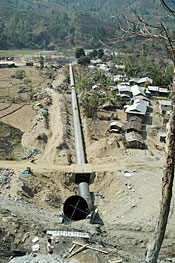 |
The government is on its way to forge deals with several domestic and foreign investors for building seven mega hydropower projects. But the Maoist decision to stop these projects has raised serious concern about the future of hydropower in the country. It is clear that the Maoist decision to halt operation of five projects with Indian and Nepali investment is politically motivated. In fact, some of these projects had been given permission for feasibility studies by the Maoist-led government itself. The Maoist decision has come at a time when its leaders have been publicly complaining about how India has hindered them from forming the government and this can't be mere coincidence. Hydropower which remains Nepal's biggest hope for economic growth has once more turned into a political weapon.
Nepal's trade gap with India is Rs 17.7 billion, that deficit can only be plugged with hydropower exports. A World Bank report pointed out energy deficit as the biggest obstruction to commercial development in Nepal. Power cuts have forced businesses to use diesel generated electricity, which has led to a rise in the production cost. Also, millions of worth of generators and inverters are being imported every year. The cost is passed down to consumers. Last winter there was 16 hours of power cut every day. This year it is likely to be repeated. Instead of exploiting hydropower for political gains, the Maoists should be helping the projects to gather momentum. They should keep national interest above politics and call off their ban at once.
READ ALSO:
Gautam for president
Risking their lives to go to school
Till when?
MPs hiding pins
Madan Puraskar
To the streets


